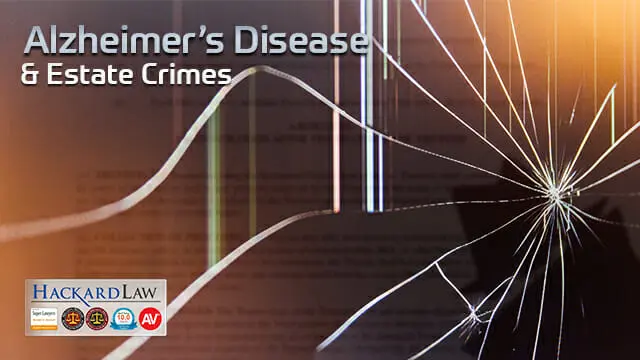
Alzheimer’s, Dementia & Estate Crimes | A Disastrous Mix
Alzheimer’s is the most common form of dementia. Millions of American families are dealing with its effects on the sufferer and those around him or her. Almost two-thirds of the 5 million plus Americans who have Alzheimer’s are women.
We represent both Alzheimer’s patients and their families in civil litigation against estate wrongdoers. Federal, state and local law enforcement agencies are responsible for the criminal prosecution of elder abuse and financial exploitation.
Our necessary focus on civil litigation provides us a perspective on the common elements that we see in elder financial abuse cases. This perspective starts with the recognition of how memory loss affects the Alzheimer’s victim.
Early-stage Alzheimer’s is marked by forgetting of recently learned information. The victim might ask for the same information over and over. Trouble with concentration is common – affecting the ability to keep track of monthly bills. Daily tasks are affected as is confusion as to surroundings – a problem identified with dangerous driving. Struggles with vocabulary, property loss and impaired judgment are typical to an Alzheimer’s patient.
These changes invite withdrawal as the maintenance of regular social interactions is challenging. A person with Alzheimer’s suffering confusion and depression is often suspicious, fearful and anxious about their life. These emotional changes create great vulnerability to the undue influence of others.
So how does estate crime or estate wrongdoing enter into this? Millions of Americans likely know the answer. Their father or mother is suffering from memory loss and daily tasks are challenging. It is clear that the elder has impaired judgment.
Telephone marketers become dangerous. Caregivers spend more time with an impaired parent than family members. Family members who are dependent on the impaired parent gain or monopolize access to the elder. Property goes missing, the elder becomes paranoid, and the family’s concern grows with time – a concern often not met with action because of bewilderment as to what to do.
The full effects of estate wrongdoing are often not known until the elder has died and the financial aspects of her estate are reviewed. Our cases cover the spectrum of the discoveries made in post-mortem reviews.
A caregiver engineers the transfer of estate assets prior to the elder’s death. The caregiver selects the elder’s lawyer, identifies the plan of distribution and drives the elder to the lawyer’s office. A wrongdoer effectuates an estate plan for an incompetent, blind, illiterate, or non-English speaker (take your choice – we’ve seen this so many times) who clearly doesn’t understand the import or nature of the estate plan.
Not all wrongdoing can be remedied. Not all wrongdoers meet justice. But some do. And some remedies work remarkably well.
If some of the wrongdoing described resonates with what you are seeing, want to prevent or want to remedy, call us at Hackard Law 916 313-3030. We represent people in cases where we think that we can make a significant difference against wrongdoers who can be made financially accountable for their wrongdoing.
Our practice often involves litigation in California’s major urban areas, including Sacramento, Los Angeles, Riverside, Alameda and Santa Clara Counties.

 (916) 775-8542
(916) 775-8542